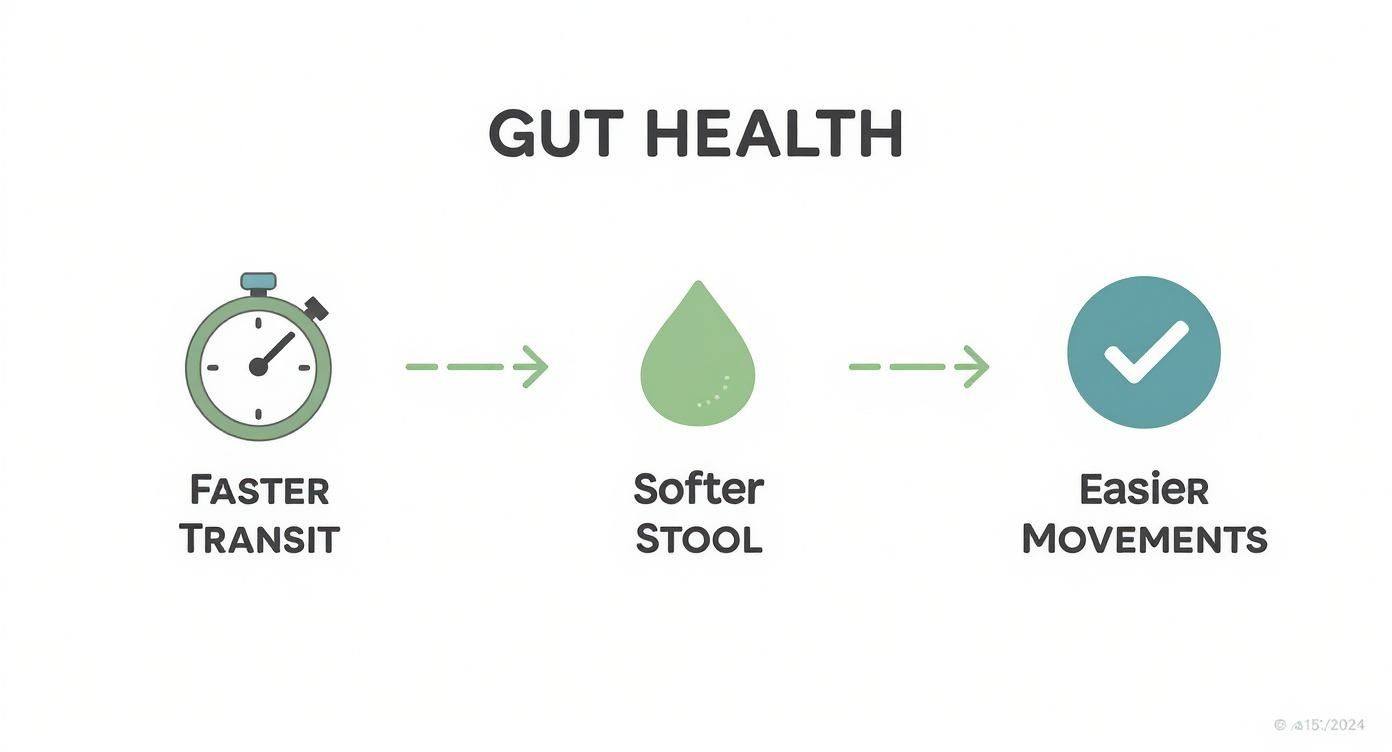Finding the Best Probiotic for Constipation (and Finally Feeling Relief)
Feeling bloated, heavy, and just plain stuck? You are not alone. When you're dealing with constipation, that backed-up feeling can throw off your entire day, and frankly, it's frustrating. We get it. The search for the best probiotic for constipation is really about finding a way to feel like yourself again.
But what if relief was simpler than you thought? This guide is your straightforward map to understanding how these "good bacteria" can genuinely help you reclaim natural regularity and comfort. We're going to cut through the confusing jargon and focus on what truly works, so you can make a choice that actually gets things moving.

What You Will Learn
This guide is all about giving you practical, easy-to-understand information. Here’s what we’re going to cover together:
- The Science, Simplified: We'll break down how probiotics actually work to relieve constipation, no biology degree required.
- The Key Strains to Look For: You'll learn the names of the most effective bacteria to find on a label, like Bifidobacterium lactis and Lactobacillus plantarum.
- How to Pick a Quality Supplement: We'll decode what CFU counts and delivery methods mean for you and your gut.
- Simple Habits to Boost Results: I'll share lifestyle tips that help your probiotics work even harder.
For truly sustainable relief, it's smart to think bigger than just one supplement. Embracing a holistic wellness approach that considers your mind, body, and spirit creates a powerful foundation for your entire gut health journey.
Our goal here is to leave you feeling understood, optimistic, and fully prepared to make a smart choice for your digestive health. Let's get started.
Quick Guide to Top Probiotic Strains for Constipation
To get you started, here’s a quick-reference table that highlights the superstar strains for constipation. It breaks down what they are, how they work, and where you can typically find them.
| Probiotic Strain | How It Helps With Constipation | Commonly Found In |
|---|---|---|
| Bifidobacterium lactis | Speeds up intestinal transit time, making bowel movements more frequent. | Yogurt, kefir, and targeted probiotic supplements. |
| Lactobacillus plantarum | Helps soften stool and reduces bloating and gas associated with constipation. | Sauerkraut, kimchi, and high-quality supplements. |
| Bifidobacterium longum | Improves stool consistency and supports overall gut environment for regularity. | Fermented foods and multi-strain probiotic formulas. |
Keep these three in mind as you start looking at labels. They are some of the most researched and effective options out there for promoting regularity.
How Do Probiotics Actually Help You Go?
It's easy to dismiss probiotics as just another wellness trend, but there's solid science explaining how they tackle something as frustrating as constipation. When you're feeling blocked up, it's often a sign that your digestive system has slowed to a crawl. Probiotics can help get things back on track.
Picture your gut as a busy neighborhood. For everything to run smoothly, you need a healthy balance of friendly residents (good bacteria). When that balance gets thrown off, issues like constipation are often the result.
Getting Things Moving Again
One of the main ways probiotics offer relief is by improving gut motility. That’s just a science-y term for how efficiently your intestines move food and waste along. When motility is sluggish, stool hangs around for too long, becoming hard, dry, and difficult to pass. Yikes.
Think of specific probiotic strains as personal trainers for your digestive tract. They encourage the muscles in your intestinal walls to contract more regularly and effectively. This provides a gentle, natural nudge that helps move waste along at a healthy pace, preventing backups and leading to more predictable, comfortable bowel movements.
Making Stool Softer and Easier to Pass
Probiotics also change the actual consistency of your stool, which is a total game-changer. Hard, pebble-like stools are a classic sign of constipation and can make trips to the bathroom a painful ordeal. Probiotics help by producing beneficial compounds, most notably short-chain fatty acids (SCFAs).
These SCFAs are fantastic for a couple of reasons:
- They draw more water into your colon, which is the most natural way to soften stool.
- They also feed the cells that line your intestines, contributing to a healthier gut environment from the ground up.
The end result? Stool becomes softer and much easier to pass. That means less straining and a whole lot more relief.
Science Corner: What the Research Says
Don't just take our word for it; the research backing probiotics for constipation is piling up.
A major review of 10 clinical trials, covering over 1,200 people with chronic constipation, found that probiotics significantly sped up how fast waste moved through the gut. In plain English, that means food moved through much faster for the people taking good bacteria compared to a placebo. You can read more about these probiotic findings.
What this means for you: choosing the right probiotic isn't just wishful thinking. It's a research-supported strategy for getting regular by addressing the core issues behind constipation.
Comparing the Most Effective Probiotic Strains
Walking down the supplement aisle can feel like a pop quiz you didn't study for. When you’re trying to find the best probiotic for constipation, the secret isn't just grabbing the bottle with the biggest numbers. It’s all about the specific strains inside. Think of them as tiny specialists, each with a unique job to do for your gut. Let's meet the A-team.

This simple flow shows how the right combination of strains can work together to create a smoother, more comfortable digestive experience from start to finish.
Bifidobacterium Lactis: The Motility Booster
If your biggest frustration is that things are just… not… moving… then Bifidobacterium lactis is the strain you want on your side. This one is a rockstar in the world of digestive health, backed by a ton of research. Its main claim to fame is its proven ability to speed up "gut transit time."
Simply put, it helps your intestines gently nudge waste along at a much healthier pace. The result? More frequent, predictable bowel movements and less of that heavy, backed-up feeling. It’s the go-to strain for getting your system back on a regular schedule.
Lactobacillus Plantarum: The Bloat Soother
Is your constipation usually accompanied by its uncomfortable sidekicks, bloating and gas? Dun, dun, dun... that’s where Lactobacillus plantarum really makes a difference. This particular strain is a wizard at improving the overall gut environment.
It helps soften stool, which is a game-changer for making bowel movements easier and less strained. Beyond that, it helps balance out the bacteria in your gut, which can dramatically reduce that awful "puffed up" feeling. If bloating is what makes you most miserable, keep an eye out for this strain.
Key Takeaway: The best probiotic for constipation often includes multiple, well-researched strains. Each one brings something different to the table, creating a more complete solution for your digestive comfort.
Bifidobacterium Longum: The Gut Harmonizer
Think of Bifidobacterium longum as the foundational support for your entire digestive system. While it definitely helps with stool consistency and regularity, its primary job is to foster a healthy, balanced gut microbiome.
This strain helps create an environment where all your good bacteria can really thrive. A well-balanced gut is simply more resilient and efficient, making it much less likely to run into issues like constipation in the first place.
Detailed Probiotic Strain Comparison for Constipation
| Strain Name | Mechanism of Action | Ideal for Addressing | Level of Scientific Evidence |
|---|---|---|---|
| Bifidobacterium lactis | Directly speeds up gut transit time by stimulating intestinal muscle contractions. | Slow transit, infrequent bowel movements. | High |
| Lactobacillus plantarum | Softens stool by increasing water content and reduces gas by balancing gut flora. | Hard stools, bloating, and gas accompanying constipation. | High |
| Bifidobacterium longum | Promotes a balanced microbiome, which indirectly supports regular bowel function. | General gut health, preventing recurring constipation. | Moderate to High |
Ultimately, the goal is to find a supplement that doesn't just put a band-aid on the symptom but actually supports the entire system. Understanding these key players empowers you to look at a supplement label and know exactly what you’re getting. You can learn more about how these powerhouses work together in our guide to probiotics with multiple strains.
How to Select a High-Quality Probiotic Supplement
Knowing which probiotic strains can help with constipation is a great start. But when you're standing in the supplement aisle faced with dozens of options, how do you actually pick a winner? It's all about learning to read the label like an expert, and we’ll walk you through exactly what to focus on.

Let's unpack the few key factors that separate a genuinely effective probiotic from one that’s just taking up shelf space. This will give you the confidence to choose the right supplement to get things moving again.
Decoding CFU Count
One of the first things you'll notice on any probiotic bottle is the CFU count. This stands for Colony Forming Units, which is simply a measure of the number of live, active bacteria in each dose. It's a common misconception that a bigger number automatically means a better product, but that's not the whole story.
A sky-high CFU count isn't the goal. What really matters is getting a clinically effective dose of the specific strains proven to help with constipation.
For constipation relief, a therapeutic dose often lands somewhere between 1 and 10 billion CFUs. In fact, a 2022 clinical trial showed that formulas with just 3 billion CFUs were as effective as those with 8 billion at improving bowel frequency and stool consistency. You can read the full research on CFU effectiveness here. This drives home the point that a well-designed, targeted product is far more important than just cramming in the highest number of bacteria.
Strain Diversity and Delivery Method
Next, check the label for a smart blend of the strains we've already covered, like Bifidobacterium lactis and Lactobacillus plantarum. Think of it as teamwork; a multi-strain formula can offer broader benefits by tackling motility, bloating, and stool consistency from different angles.
Finally, you have to consider the delivery technology. Your stomach is an incredibly acidic environment, and those delicate probiotics need some serious protection to make it to your intestines intact. Look for a few key features that ensure they arrive alive:
- Acid-resistant capsules: These are specially designed to survive the journey through the stomach and only dissolve once they reach the intestines, right where you need them.
- Shelf-stability: This is a crucial feature. It means the probiotics remain viable and potent at room temperature, so you don't have to worry about refrigeration.
Opting for a supplement with these protections ensures you're getting the full value of what you paid for.
Yuve's Take on Achieving Digestive Harmony
After digging into the science, one thing became clear: picking the right probiotic for constipation shouldn’t be a roll of the dice. It's about finding a smart, targeted formula that gets to the heart of what’s slowing your system down. We know that journey can be frustrating, so we created a solution based on everything we’ve learned.
Our mission was to create a single, effective supplement that brings together the right strains in the right amounts to offer genuine, noticeable relief.
Our Secret? The Probiotic + Prebiotic Partnership
We didn't just throw a bunch of popular ingredients into a bottle; we chose each one for a specific job. Our Yuve Daily Cleanse Probiotic + Prebiotic is built for real digestive harmony, and it all comes down to two key elements.
First, we put Bifidobacterium lactis front and center. This is the powerhouse strain known for its ability to improve gut motility-in other words, it helps get things moving again at a comfortable, natural pace.
Second, we added prebiotics. This is where the magic happens. Think of prebiotics as the fertilizer for your gut's garden. These special fibers are food for your good bacteria, helping them thrive and colonize your gut properly. This partnership makes the entire formula work better, creating a healthy environment for long-term digestive balance. It’s a proactive step to help you feel great. You can check out our tasty and effective probiotic gummies to see just how easy gut support can be.
A Message From Our Founder
For us, this isn't just another product on the shelf-it's personal. Our founder, Sam, spent years wrestling with his own digestive issues, from painful bloating to unpredictable irregularity. He knows exactly how a sluggish gut can sap your energy and drain your quality of life.
"I wanted to create something I wish I had back then-a clean, effective, and straightforward solution that people could trust. After countless hours of research, we developed a formula that combines clinically-backed probiotics with the essential prebiotics they need to flourish. It’s about creating harmony from within, so you can get back to feeling like yourself." - Sam, Yuve Founder
That personal experience is built into every bottle. We developed our Daily Cleanse Probiotic + Prebiotic to be the simple, no-nonsense answer for anyone tired of the endless cycle of constipation and discomfort.
Simple Ways to Maximize Your Probiotic's Effectiveness
Popping a high-quality probiotic is a fantastic start, but you can really supercharge the results by creating an environment where those good bacteria can actually thrive. Think of it like planting a garden-you don't just toss the seeds on the ground and hope for the best. You have to prepare the soil.
Making just a few small tweaks to your daily routine can make a world of difference, helping you get the comfortable, regular digestion you’re looking for.
Quick Wins for a Happier Gut
When it comes to gut health, consistency is king. You can't just take a probiotic here and there and expect a miracle. Research shows that the real magic happens with sustained, daily use. One study found that after 71 days, a group taking a multistrain probiotic reported significantly more frequent bowel movements. It's a marathon, not a sprint. You can read more about how consistent probiotic use improves regularity.
Beyond taking your supplement every day, here are a few simple habits that create the perfect welcome party for good gut bacteria:
- Hydrate, Hydrate, Hydrate: Water is non-negotiable for smooth digestion. It helps soften stool, making everything move along much more easily. Keep a water bottle handy and sip throughout the day.
- Feed Your Friends with Fiber: Probiotics need to eat, and their favorite food is fiber. By loading up on fiber-rich foods like fruits, veggies, and whole grains, you're giving them the fuel they need to thrive. For some great ideas, check out this resource on 5 foods that help with hemorrhoids.
- Get Moving (Gently): You don't need to run a marathon. Even a simple daily walk or some gentle stretching can stimulate your digestive tract and encourage motility, which helps keep things moving.
When you pair a targeted supplement like Yuve’s Daily Cleanse Probiotic + Prebiotic with these supportive habits, you’re creating a powerful system for total digestive wellness.
Your Probiotic Questions, Answered
We get it. Starting a new supplement, even a natural one, can bring up a few questions. To help you feel completely confident, we’ve put together answers to some of the most common things people ask.
How long does it take for probiotics to work for constipation?
That's the big question, isn't it? While everyone's body is different, most people notice a real, significant change in regularity after 2 to 4 weeks of consistent, daily use. Some people tell us they feel less bloated even sooner! The key is to be patient and stick with it.
Can I take probiotics with other things for constipation?
Yes, you can. Probiotics work on the root of the problem-your gut balance-so they pair well with other gentle remedies like drinking more water or adding fiber. That said, it's always a good idea to check with your doctor before combining supplements, especially if you’re considering stimulant laxatives.
Are there any side effects to worry about?
For most people, no. When you first start, a small number of people might notice a bit of temporary gas or bloating. This is actually a sign that the probiotics are getting to work and your gut is adjusting! This feeling is usually mild and goes away on its own within a few days. If it sticks around, try taking half a dose for a week to give your system more time to adapt.
What's the difference between prebiotics and probiotics?
This is a great question. Here’s an easy way to think about it:
- Probiotics are the live, beneficial bacteria themselves-the friendly microbes that support your digestive health.
- Prebiotics are basically food for those good bacteria. They are specific types of fiber that help the probiotics thrive.
Probiotics are the seeds you plant in your gut's garden, and prebiotics are the fertilizer. Combining them, like we do in our Yuve Daily Cleanse Probiotic + Prebiotic, creates a far more powerful solution.
If you have little ones struggling with this issue, we've also put together some specific information on probiotics for toddlers' constipation that you might find helpful.
Ready to help your gut find its natural rhythm? The Yuve Daily Cleanse Probiotic + Prebiotic gives your system the right strains and the fuel they need to thrive. It’s all about getting you back to feeling regular and comfortable, from the inside out. Try it today and feel the difference!
